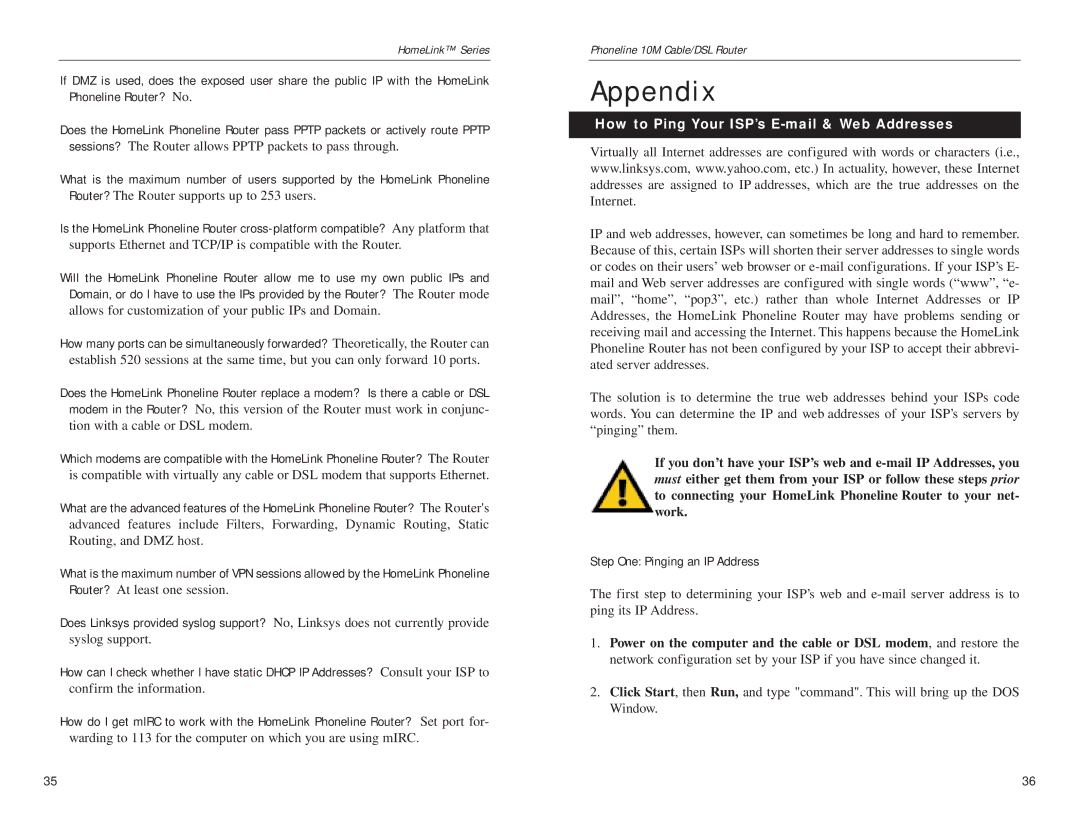
HomeLink™ Series
If DMZ is used, does the exposed user share the public IP with the HomeLink Phoneline Router? No.
Does the HomeLink Phoneline Router pass PPTP packets or actively route PPTP sessions? The Router allows PPTP packets to pass through.
What is the maximum number of users supported by the HomeLink Phoneline Router? The Router supports up to 253 users.
Is the HomeLink Phoneline Router
supports Ethernet and TCP/IP is compatible with the Router.
Will the HomeLink Phoneline Router allow me to use my own public IPs and Domain, or do I have to use the IPs provided by the Router? The Router mode allows for customization of your public IPs and Domain.
How many ports can be simultaneously forwarded? Theoretically, the Router can establish 520 sessions at the same time, but you can only forward 10 ports.
Does the HomeLink Phoneline Router replace a modem? Is there a cable or DSL modem in the Router? No, this version of the Router must work in conjunc- tion with a cable or DSL modem.
Which modems are compatible with the HomeLink Phoneline Router? The Router is compatible with virtually any cable or DSL modem that supports Ethernet.
What are the advanced features of the HomeLink Phoneline Router? The Router's advanced features include Filters, Forwarding, Dynamic Routing, Static Routing, and DMZ host.
What is the maximum number of VPN sessions allowed by the HomeLink Phoneline Router? At least one session.
Does Linksys provided syslog support? No, Linksys does not currently provide
syslog support.
How can I check whether I have static DHCP IP Addresses? Consult your ISP to
confirm the information.
How do I get mIRC to work with the HomeLink Phoneline Router? Set port for-
warding to 113 for the computer on which you are using mIRC.
Phoneline 10M Cable/DSL Router
Appendix
How to Ping Your ISP’s E-mail & Web Addresses
Virtually all Internet addresses are configured with words or characters (i.e., www.linksys.com, www.yahoo.com, etc.) In actuality, however, these Internet addresses are assigned to IP addresses, which are the true addresses on the Internet.
IP and web addresses, however, can sometimes be long and hard to remember. Because of this, certain ISPs will shorten their server addresses to single words or codes on their users’ web browser or
The solution is to determine the true web addresses behind your ISPs code words. You can determine the IP and web addresses of your ISP’s servers by “pinging” them.
If you don’t have your ISP’s web and
Step One: Pinging an IP Address
The first step to determining your ISP’s web and
1.Power on the computer and the cable or DSL modem, and restore the network configuration set by your ISP if you have since changed it.
2.Click Start, then Run, and type "command". This will bring up the DOS Window.
35 | 36 |
